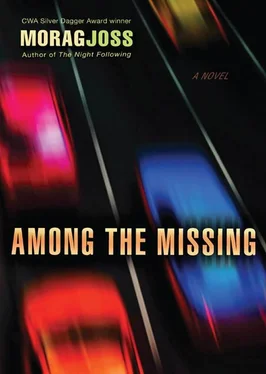“I know who you mean. He wasn’t here today. First one he’s missed,” Ron said.
“That’s what I’m telling you,” Mr. Sturrock said. “You ken why? Rhona told me. See, she had him on his own for a wee minute, one time, over the coffee kinda thing. She makes an effort, Rhona. Turns out it’s his wife. The lady that hired that car, it’s his wife, for fuck’s sake. That’s why he keeps coming. And see they bastards the day, going on like it’s a photo opportunity…” He glanced back at the jetty. “Enter-fucking-tainment. Imagine being him when that fucking car came out the water.”
“Will they ever find her body?” Ron asked. “So at least he’d know what happened to her?”
“I’ve nae fucking idea,” Mr. Sturrock said. “Poor bastard. Put a bit of speed on, will you? I haven’t got all fucking day.”
Ron’s phone rang again, and he didn’t answer. After he’d delivered Mr. Sturrock to the jetty, he checked for messages. The call was from Silva’s number, but it was Annabel’s voice.
“She’s heard about the car,” she said. “I’ve been trying to get you. Can you come today? Please come.”
When he arrived at the cabin, he found Silva sitting on the floor in her room with photographs of Stefan and Anna in her lap. She’d been that way, Annabel told him, since the news came. She had taken Stefan’s drawing of the cabin down from the wall and lit candles around it, and rocked to and fro with her hands clenched against her mouth as the candles burned, gazing at the drawing and whispering to the smiling stick figures he’d made of the three of them in fierce, spitting bursts of language of which Annabel and Ron understood not a word.
All through Saturday and Sunday they tried to care for her, but she would scarcely be deflected by entreaties to eat or rest. When Annabel spoke to tell her there was food ready or to suggest she lie down and sleep, her voice seemed to reach her, if at all, from too far away to be understood. When Ron helped her gently to her feet and brought her to the table or to her bed, she walked carefully on her numbed legs and did not look at him. She ate and slept only to regain enough strength to return to her place on the floor.
But she did not weep, and on Monday morning she was up and ready early to go to Vi’s. The radio was now repeating that the police had confirmed the bodies were those of a man and a child and that the car was the one rented by a woman tourist, who was still missing. And so, Silva announced to the others, these were the bodies of two other people. Stefan never hitched lifts when he had Anna with him because he always said if he ran into trouble he could defend himself all right alone, but he couldn’t be sure of defending her as well. Besides, she said, the police didn’t even say the child was a girl.
She spoke in a firm but faded voice, as if she were under a kind of hypnosis of both hope and dread; an entranced, defiant look had entered her eyes. She got through the next few days at Vi’s, returning exhausted to her candles and photographs and incantations. On the fifth day, she did not go to work because she woke after a vivid dream of Stefan, who had borne a message that the answer to her prayers was nigh. This would be the day they came back. She waited at the cabin all day, and the next, and the next.
For the entire week Ron’s workmates at the bridge traded rumors about the occupants of the car. People sat on in the canteen past their break times, talking and arguing. Ron just listened; nobody asked for his opinion, and he gave none, and least of all would he have said anything about Silva and her vigil for Stefan and Anna, or about the husband of the missing woman and his presence at every bridge walk. Even if he could have strung the words together, Ron believed he had no right to offer up for their scrutiny any stories, and such desperate ones, that belonged to other people.
One rumor was that the child was strapped in the back and nesting in a tangle of blankets as if asleep and the man’s body was floating free and twisting, arms outstretched, toward her. Another had it the other way round, the child reaching for him; another, that the child was cradled in his arms. And who were they, the workmen speculated, and where was the woman who had been or should have been driving? Were they hitchhikers? No sane woman alone picked up hitchhikers. But had she stopped for these two (had it been raining that day?), either for the child’s sake or because the very presence of the child had made her feel safe? But suppose the man was just a car thief, albeit one who operated with a child in his care, and he had stolen the car; where then was the woman? Was the man also a murderer? Had he killed her in front of the child? So where was her body?
The word went round that, when the car was hauled from the river, the driver’s door had not been closed. Ron sat quietly and heard the theories: the door lock must have burst on impact with the water; it had been broken in a collision with other wreckage; it had been corroded and prized open by the tides. But the favored version was that a third occupant, the woman driver, had managed to open the door and get out but had not made it to the surface. She must have been drowned and her body dragged out to sea. The bridge workers had it all worked out, they reckoned, on the balance of probabilities; meanwhile the police investigation continued with what they considered perverse slowness.
Ron was grateful that the patterns of his physical life-work on the boat, food, jobs at the cabin, sleep-kept him immersed in practical tasks and with little time to think. Whatever had happened to the woman, and whoever the man and child had been, all three were lost. And while the deaths of people he had never known were losses abstracted and at a remove, loss recalled all losses. He was sad for their deaths and felt they should be contemplated in silence, in the unshared privacy of his own mind; the thought of their suffering hurt and frightened him. He returned gratefully at the end of each day to the cabin, where such matters could not be discussed.
After two weeks, no next of kin had come forward. On its front page, under the headline POLICE APPEAL TO FAMILY OF MYSTERY VICTIMS, the Inverness Herald printed a photograph of the man’s neck chain and the half-perished remains of a toy giraffe. It also reported that DNA tests showed the bodies were overwhelmingly likely to be those of a father and child. Ron brought the paper with him that evening as well as a can of diesel for the generator, a tub of leftover coleslaw, and a bottle of whiskey. Silva was once again at her devotions. He showed the front page to Annabel, who was peeling potatoes at the table. These days she sat down to do such tasks.
“Oh, God, no,” she said. “Don’t let her see it. Oh, God, what are we to do?”
“She has to see it,” Ron said. “She’s bound to see it sometime. It’s better if we’re the ones to show her.”
“Why?” Annabel said. “What good will it do?”
Ron was taken aback. “If it’s not Stefan and Anna, think how relieved she’ll be,” he said simply.
“But it is them… I’m sure it is. She won’t be able to bear it.”
“If it is, she has to know. She’ll have to know sooner or later.”
Annabel gazed at the door to Silva’s room, her face suddenly white. “She’ll have to know sooner or later,” she repeated stupidly. She turned to Ron. “Don’t leave tonight. Stay. Don’t leave me alone with her.”
Silva’s door opened and she wandered in, casting a severe little smile at Ron. Her eyes were overbright, and her hair, as it always was these days, was pulled back under an exuberant purple plastic chrysanthemum that looked doubly absurd above her pinched face. She glanced at the pan of potatoes and slumped into a chair at the table.
Читать дальше












